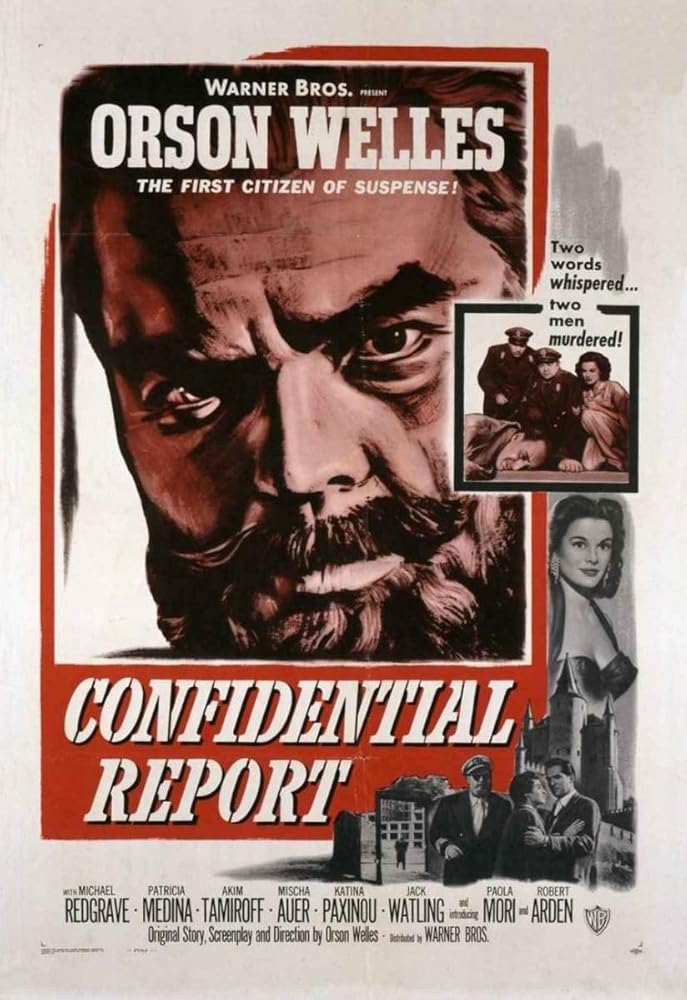
MR. ARKADIN (CONFIDENTIAL REPORT)
(director/writer: Orson Welles; screenwriter: from the novel by Orson Welles; cinematographer: Jean Bourgoin; editor: Renzo Lucidi; music: Paul Misraki; cast: Orson Welles (Gregory Arkadin), Paola Mori (Raina Arkadin), Katina Paxinou (Sophie), Gregoire Aslan (Bracco), Michael Redgrave (Burgomil Trebitsch), Jack Watling (Marquis of Rutleigh), Patricia Medina (Mily), Akim Tamiroff (Jakob Zouk), Robert Arden (Guy Van Stratten), Mischa Auer (The Professor); Runtime: 99; MPAA Rating: NR; producer: Louis Dolivet; Warner Brothers; 1955-France/Spain/UK)
“A bemusing melodrama that is bizarre.”
Reviewed by Dennis Schwartz
A late work from Orson Welles–in which the great artist is writer, director and star–entitled either Mr. Arkadin or Confidential Report. It’s a bemusing melodrama that is bizarre, enigmatic, witty and, most of all, very silly. Though lacking suspense for the thriller it was meant to be, it still remains interesting as a “pulp” fictionalized biography about power and corruption–connecting the world leaders and wealthiest citizens of the world to their corrupt roots. This romanticized vision exhibits Welles’s huge love of his own persona (an egomania where he compares himself tongue-in-cheek to Citizen Kane and God). The gargantuan filmmaker in stature, size and appetite, shows off his ability to compose a visually beautiful picture on a shoestring budget. Using black-and-white photography and a multitude of diverse camera angles and a most endearing baroque style, Welles’s flawed film always remains visually stunning.
Guy Van Stratten (Robert Arden) is an American hustler who sticks his nose into something that doesn’t concern him: a shoot-out near the Milan waterfront. Trying to help a dying man, Guy’s lady Mily is whispered two names: Gregory Arkadin (Orson Welles) and Sophie. Realizing the mysterious Arkadin is the world’s wealthiest man, the con man sees this as an opportunity to make some serious bread. After following Mr. Arkadin to a resort area in Spain, he makes an intro through his beloved daughter Raina (Paola Mori). Attending a costume party in his own castle, Arkadin absences himself from the party to present a confidential report he has on Guy–exposing him as an idle adventurer and small-time con man. Arkadin then makes Guy an offer he can’t refuse, as he’s hired to investigate the wealthy man’s past. It’s explained that an amnesia overcame Arkadin in 1927, which has left him without a memory of his past. Arkadin, in turn for paying well for this assignment, stipulates that this means Guy will never see his daughter again. Guy agrees, and starts his travels in Eastern Europe where Arkadin began his climb to the top. He soon learns that Arkadin was a white slaver, who made his money peddling the flesh of innocent women. It soon becomes apparent that everyone Guy comes into contact with turns up dead. Guy realizes that his life is in grave danger; that Arkadin only used him to destroy all links to his past and when the last link, Jakob Zouk, is gone, it will also be his termination. The con man’s only hope for survival is to have Raina tell her father that she knows everything about him. The foolish egomaniacal tycoon would rather kill himself than let his daughter know he was a mere mortal–thereby merely a flawed man and not a God.
There are many great pieces of dialogue sprinkled throughout this messy film: Mr. Arkadin: “A fool is a man who pays you twice for the same thing.” The Professor (Mischa Auer): “Cops are dumb because they don’t have to be anything else.” But what best explains the film’s theme is told by Welles as a parable about the scorpion who convinces the frog to take him across the river after promising not to sting him, but stings him anyway. When the frog asks “Why?” the scorpion replies: “That is my nature.” So it is with Mr. Arkadin, who will be destroyed by his corruption because he can’t change his nature.
REVIEWED ON 1/14/2005 GRADE: B-